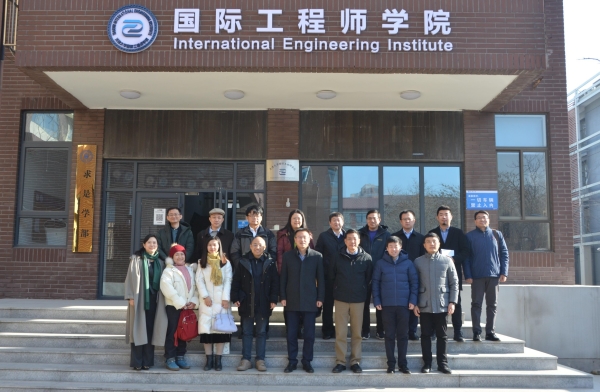QHC (TIEI) Held A Seminar on Postgraduate Education Reform
2020-11-17
In order to implement the requirements of the National Postgraduate Education Conference, learn from the spirit of the Fourth Postgraduate Education Work Conference of Tianjin University and respond to the deployment of the school’s postgraduate education reform work, as a platform for the interdisciplinary construction of Tianjin University, QHC (TIEI) held a seminar on postgraduate education reform on November 17, and invited heads from the Graduate School, Office of Science and Technology, College of Intelligence and Computing and other schools to participate in the meeting. All the participants closely focused on the topic of practice “Double First-Class” construction and jointly built a multidisciplinary cross platform. The meeting was presided over by Shan Xiaolin, Party Secretary of QHC.

Shan Xiaolin first introduced the background of this meeting. He pointed out that multidisciplinary integration is the driving force and source of innovation, and is an important feature of scientific and technological development. As a multidisciplinary platform of the school’s “Double First-Class” construction, QHC (TIEI) has a good foundation for talent training and cooperation with the co-constructed schools, and will always be committed to cultivating future-oriented innovative talents.
Focusing on the interdisciplinary construction of Tianjin University, Hu Minglie, Director of the Discipline Office of the Graduate School, introduced the background and analyzed domestic and foreign interdisciplinary cases. He emphasized that the school will continue to strengthen the top-level design of disciplines and create a characteristic interdisciplinary organizational model of TJU. Taking the “Double First-Class” construction discipline as the core, the school will select high-quality students, build a stable interdisciplinary tutor group and explore effective mechanisms for interdisciplinary development with problem-oriented and demand-oriented.
Fu Yindan, the Deputy Dean of the Office of Science and Technology, with the topic of “Key technologies need to be broken through and rely on the scientific research interdisciplinary” discussed the foundation and challenges of the school’s interdisciplinary research from the aspects of the new situation, new challenges and new actions of it. She emphasized that universities are one of the national strategic scientific and technological forces, and the interdisciplinary road of universities is imperative. In order to build an innovative country, it is necessary to open up interdisciplinary fields, rely on multidisciplinary platforms, take the major scientific research tasks as the traction, introduce high-quality enterprise resources, and promote the development of interdisciplinary cross platform.
Guan Jing, Deputy Director of QHC, introduced the future development plan of QHC to the participants, and elaborated from the aspects of specialty reconstruction, teaching mode reconstruction, professional breakthrough path, curriculum and degree integration mode, etc. She said that the college will build 2.0 plan with the concept of “co construction, sharing, openness, integration and win-win” and fully develop it with the function of interdisciplinary cross platform. And we will construct the project-based curriculum system through the establishment of a perfect tutor selection and appointment mechanism, and form an innovation ecosystem of interactive integration of talents, disciplines and scientific research with the quality assurance of Interdisciplinary Working Committee .

During the free discussion stage, all the participants focused on the “input and evaluation mechanism”, “training scheme and curriculum system construction”, “tutor group appointment and management mechanism”, “the establishment of a degree evaluation committee and the path of degree awarding” and other topics to conduct in-depth discussions, and provide suggestions for the development of the joint construction platform.


This meeting aims to break disciplinary boundaries, provide a platform for ideological collision and academic exchanges, promote interdisciplinary and academic innovation, and discuss the construction of a multidisciplinary platform.
(By:SHAO Chen Translator:ZHANG Xiaojuan)



